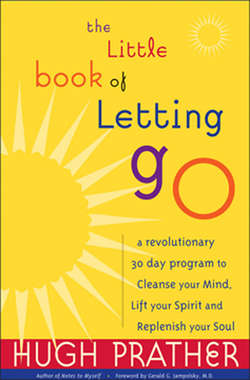Читать книгу The Little Book of Letting Go - Hugh Prather - Страница 19
На сайте Литреса книга снята с продажи.
Letting Go of Worry
ОглавлениеVery few people are convinced that worry is useless mental debris. Somehow, it just seems right to worry. We reason that since everyone does it, it must serve a purpose. This is like saying that since we all betray each other in little ways, betrayal must be beneficial to the human species. It is patently untrue that each human impulse has a positive aspect and fits into “the grand scheme of things.”
To progress spiritually, we have to acknowledge that we make mistakes, sometimes bad mistakes, and that we have at least some innate tendencies that are harmful and unreasonable.
“The wisdom of the body” is highly questionable, as anyone with insomnia or allergies is reminded almost daily. The wisdom of the brain, as part of the body, is equally questionable. In fact, the body, including the brain, doesn't react consistently or as a whole to anything. What is good for one part of the body is often bad for another part. In countless small and large ways, the body divides and wars against itself and is often the primary cause of its own destruction.
Likewise, the mind has many parts, each with its own agenda. For instance, it often longs for something and is repulsed by it simultaneously—whether money, sweets, sex, or leisure. We simply can't say that because most minds worry, they do so “for a reason.” Not every human proclivity is rational, as is shown for example by the staggering number of humans who must be confined to jails, penitentiaries, psychiatric wards, and mental hospitals throughout the world. So let's first examine several “enabling” attitudes our culture has about worrying to see if there is any benefit in using our minds in this way.
